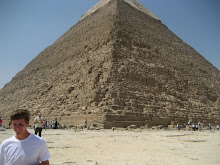But wait Matt, Upper Egypt you say? Isn't Alexandria in Upper Egypt? Technically, sort of. Egypt orients itself geographically upside down. Lower Egypt is northern Egypt and Upper Egypt is southern Egypt. Unlike some Egyptian oddities, there is actually a reason for this one. Egypt, I believe, orients its labels by the Nile, rather than the cardinal directions. Therefore, Lower Egypt is the delta region where the river meets the sea and Upper Egypt is upstream.
Aswan and Luxor are home to some of the oldest and most amazing temples and ruins on earth. In Aswan, we visited Abu Simbel, a temple located 40 km north of the Sudanese border.

Pretty sweet, huh?
Abu Simbel was built in honor of Pharaoh Ramses II. Taking the four humongous statues as a subtle hint, Ramses II considered himself the hottest thing since agriculture. (Sliced bread was still yet to come.)
Abu Simbel is part of a greater tragic story. In 1960, Egypt began construction of the High Dam at Aswan, designed to tame the Nile waters and grant Egypt control over the yearly floods that could potentially disrupt crop yields. The damming of the Nile (pun intended?) created Lake Nasser, the world's largest artificial lake and also threatened to destroy countless Nubian settlements and ancient Egyptian monuments. The Egyptian government essentially evicted the Nubian people from their historic land while the international community scrambled to catalog or salvage the priceless ruins that lay in the basin to be consumed by the lake.
Abu Simbel was one of these monuments. To save the temple, engineers tediously dismantled the temple and moved it 60 meters out of the way of Lake Nasser. The operation took several years. For those temples that were dismantled and moved there are numerous known and countless unknown monuments now lost under Lake Nasser. Big stupid lake.
I have been making a conscious effort to keep these entries short because I know too much rambling becomes hard to read. I feel, however, that there's something I must say.
I do not like the Aswan dam. Not one bit. It may have granted Egypt control over the Nile but this control came at the cost of a certain slow death for Egypt. If a certain quick death was the alternative, I suppose this outcome would not be so bad. I'm not sure that was the case, however.
Egypt, historically and still to this day, depends completely on the Nile. Its waters give life to the agricultural delta regions that feed the country. The Aswan dam now effectively stops the river silt that replenished the fields from reaching those regions. This has lead to an increased reliance on chemical fertilizers that have contaminated adjacent water supplies and leeched life from the soil. The acclaimed benefits brought by the dam such as no wild, destructive floods and longer growing periods due to increased water availability have come at too steep a cost. Egypt is in real trouble if it kills the Nile.
Thank you for understanding. I feel much better now. Well, sort of.
The highlight of the trip to Upper Egypt was the four day falucca trip down (heading north) the Nile from Aswan toward Luxor. What is a falucca you ask? Let me show you:
 That beauty you're looking at had many names: The Ferrari boat, Rolling Stone, and Princess Sara.
That beauty you're looking at had many names: The Ferrari boat, Rolling Stone, and Princess Sara.On the falucca we got to relax, nap, read, eat, play music, and make music. (We did many things but those are what first came to mind.) We also learned some falucca language. For those nautically savvy readers, I regretfully do not mean the names of the different parts of the boat. Falucca sailors develop their own language for the more colorful parts of life such as drugs, beer, and women. Consider it cultural immersion. Be proud, Dad.
Only part of the group rode the falucca. The others took a luxurious Nile cruise complete with buffets at every meal, a pool, dance floor, sheets, and running water. Not like I'm jealous or anything. Seriously though, the falucca was unforgettable.

For those concerned, I only sort of got in the Nile. The Nile is notorious for bilharzia, a disease caused by parasitic worms that live in the water and affect a ridiculous percentage of the Egyptian population (something like 40? More? I'm kind of guessing. I know it's a lot though)
Once in Luxor, we visited the must see sites and temples around the city: The Valley of the Kings, Karnak, Der al-Medina, Der al-Bahari, and Medinat Habu. Splendid they all were. I'm sure we missed somethings too. Luxor is just saturated with history. They'll let anyone in though.

To bring a little life back to the temples that are rather lifeless, we did yoga and played sardines during our visit to the Luxor temple. It was so much fun.
We also visited Banana Island, a protectorate of the Banana Republic (I kid.) Banana Island is known for, surprise, its bananas. The bananas were plentiful but just okay. My inquires into Pancake Peninsula and Chocolate Cake Atoll were met only with curious looks. Rats. On the bright side, my friends can do some super fruit impressions.

Egyptian studentry, counting in Farsi, and real living




3 comments:
awesome! who must be polish?
wow. i knew this whole thing was a luxury travel boondoggle. now the truth comes forth.
dam hatter..
Alright, we must have a ride on the boat as well. Looks beautiful. So basically, you will have seen everything you are taking Sara and me to see! posts are great.
Post a Comment